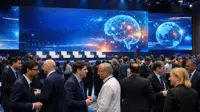India, US end WTO wrangle over food stockpiling
13 Nov 2014
New Delhi is reported to have hammered out an agreement with the United States to end the 'impasse' over the so-called trade facilitation agreement, which its proponents claim, will give a $1-trillion boost to global trade.
 After months of US discord over India stockpiling food for distribution among millions who earn less than a dollar a day, commerce minister Nirmala Sitharaman said that India and US had reached an agreement with regard to public food stock holding, to help resolve the present deadlock in the World Trade Organisation.
After months of US discord over India stockpiling food for distribution among millions who earn less than a dollar a day, commerce minister Nirmala Sitharaman said that India and US had reached an agreement with regard to public food stock holding, to help resolve the present deadlock in the World Trade Organisation.
The powerful western countries and other influential agricultural economies see a threat in India's food stockpiling as it would hamper their bargaining power and may jeopardise chances of food exports to developing countries like India.
"India and the US have successfully resolved their impasse over food security issues in #WTO," Sitharaman tweeted. "WTO General Council will receive India's proposal and US will support us."
Sitaraman did not reveal any details of the agreement worked out between the two nations.
"The WTO General Council has to consider India's proposal," she said, expressing the hope that approval would clear the way for India to sign a protocol enabling implementation of the trade accord.
She said India was not against the global trade agreement but had opposed the trade facilitation agreement as some of the rules were proving a hindrance to the India's policy for food security. She also denied that India had been isolated at the WTO.
"Many countries saw merit in what we were asking for. India was never isolated or alone. Others weren't speaking up," she said.
Countries including South Africa, Cuba, Venezuela and other emerging economies had supported India's stand.
"We will continue to work for the implementation of the Bali package and Doha developmental agenda," she said.
This will "pave the way for spurring the WTO to more such success," she said, while expressing confidence that members would "take the matter forward in WTO in a constructive spirit".
"India has never obstructed trade facilitation... We were only trying to safeguard our farmer's interests," she added.
The agreement between India and US comes just before the G20 summit later this month which US President Barack Obama and Indian Prime Minister Narendra Modi will be attending.
WTO ministers had already agreed to the global reform of customs procedures during the Bali talks but were unable to overcome last minute Indian objections and get it into the WTO rule book by the 31 July deadline.
India was trying to win guarantees to protect a $12-billion annual programme to feed its poor that, according to its opponents, risks breaking WTO rules on price support subsidies to farmers.
Earlier this month, finance minister Arun Jaitley had blamed "unreasonable posturing" by some developed countries for the impasse at the WTO talks.
"India is certainly not opposed to trade facilitation. Let me make it very clear... We are agreeing to a multilateral arrangement on trade facilitation but please keep the peace clause alive till the dispute is settled with regard to the stock holding," Jaitley said at the WEF meet.
Under the peace clause, a WTO member gets immunity against penalty for breaching the food subsidy cap. As per the WTO norms, a developing nation can provide food subsidy of up to 10 per cent of the total farm output.
Jaitly also said the food stock holding arrangement, which is being calculated on the prices of 1986-87, itself appeared to be unreasonable.
"The peace clause would vanish in four years. Now all that we have requested is the settlement of dispute with regard to the food stock holding and the peace clause must continue to coexist. Therefore till you resolve that issue, India should not be taken to the dispute redressal mechanism. The peace clause must coexist. So the dispute is not with regard to trade facilitation. Trade facilitation has become a victim because of unreasonable posturing by some countries...," he said, adding that while the trade facilitation pact was negotiated timely, there is no time frame for a decision on food stock holding.
While the fact remains that India is not subsidising agriculture like in the West, but is only providing subsidised food to its poor who cannot afford to pay market rates, US and its allies say a $1 trillion opportunity was lost on account of India's refusal to ratify the Bali package as it is.
Unfair First World barriers have cost developing countries $700 billion a year in lost export earnings - some 14 times the amount that poor countries receive in aid, according to World Development Movement.
Studies have shown that current trade liberalization rules and policies have led to increased poverty and inequality, and have eroded democratic principles, with a disporportionately large negative effect on the poorest countries. Such studies have provided the impetus for restructuring the WTO as the TRO.
The numbers of people living on less than $2 per day has risen by almost 50 per cent since 1980, to 2.8 billion - almost half the world's population. And this is precisely the period that has been most heavily liberalized, according to World Bank's Global Economic Outlook 2000 report.
Recent evidence suggests that the number of people living on less than $1 per day is growing in most regions of the world (with the notable exception of China), according to World Bank's Global Economic Outlook 2000.
The world's poorest countries' share of world trade has declined by more than 40 per cent since 1980 to a mere 0.4 per cent, according to UNCTAD Conference on Least Developed Countries in 1999.
The UN estimates that poor countries lose about $2 billion per day because of unjust trade rules, many instituted by our organisation - 14 times the amount they receive in aid.
The majority of LDCs with strong import liberalization have experienced anaemic or negative growth over the past 20 years.
HIC tariffs on manufactured imports from developing countries are on average 4 times greater than those on manufactured imports from industrial countries
UNCTAD estimates that LDCs will lose between $163 and $265 million in export earnings as a result of implementation of Uruguay Round agreements, while paying $146 – 292 million more for their imports.
In 1999, outstanding external debt of LDCs was 89 per cent of their aggregate GDP. This has been increasing steadily.
The richest fifth have 80 per cent of the world's income and the poorest fifth have 1 per cent; this gap has doubled between 1960 and 2000.
In almost all countries that have undertaken rapid trade liberalisation, wage inequality has increased - 20-30 per cent fall in wages in some Latin American countries.
Even in the First World, the gap between upper executive and worker salaries has never bigger--it is in fact many times bigger than it was twenty years ago, according to UNCTAD.
''Trade liberalisation is negatively correlated with income growth among the poorest 40 per cent of the population, but positively correlated with income growth among higher income groups. In other words, it helps the rich get richer and the poor get poorer.''
A World Bank study found that implementing Uruguay Round agreements on various things can cost more than a year's development budget for the poorest countries.

















